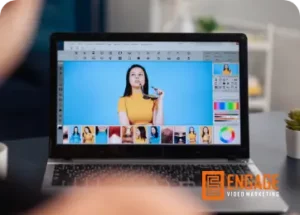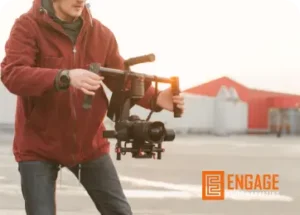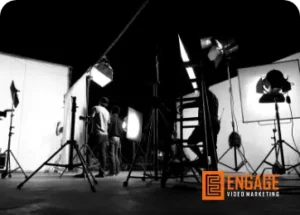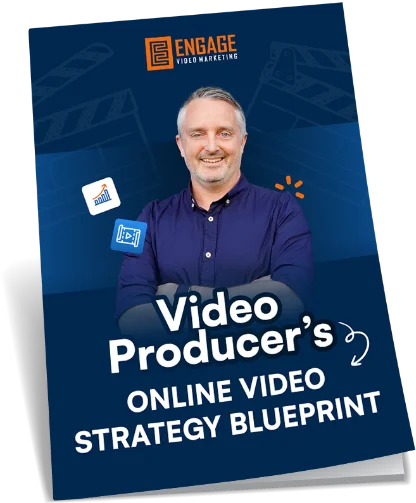In my over 12 years as a video producer and after producing over 150 interview podcast episodes let me tell you i’ve learned a thing or two about interviewing people on camera and in particular how to ensure that you get what you need for your edit. So in this article, I’m going to share with you my 8 tips for conducting better video interviews so that you know you got what you need.
1 – Be prepared
Be prepared that means do your research. Obviously know who it is that you’re interviewing but also understand what it is that you want to get out of this interview in order to produce the video that you want to produce.
Tip: Do a pre-interview.
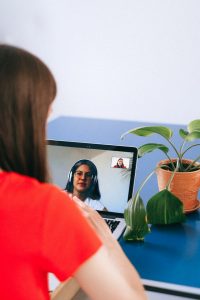
2 – Build rapport
Nobody’s comfortable on camera and it’s your job as an interviewer to make them feel comfortable as much as you can.
Tip: Have conversation with people while you’re setting up.
Naturally get to know them, ask them about what’s going on in their life right now. Start to help them feel relaxed and help them get to know you and humanise the relationship that you have with them. Even when the camera is being set up and the lights are being sorted and the sound is being organised, you want to be maintaining that conversation and building that rapport so that when the camera is recording it’s a natural transition into conducting the interview without someone feeling like suddenly they need to be on.
Tip: Don’t make a big deal out of pressing that record button.
You don’t want to be saying lights, camera, action and then launch into an interview. Nobody’s going to feel comfortable that way. Just press that record button, keep on having that conversation and then slowly lead into your specific interview questions. In many cases they won’t even know that the interview started and that is ideal.
3 – Ask open questions
A person much smarter than me once said that the quality of your life is determined by the quality of the questions that you ask. You want to be asking open questions that invoke a detailed and thoughtful response, not closed questions. So instead of asking “Did you like the product?”, you would ask “What did you like about the product and why?” That’s going to elicit a much better response from your interview.
4 – Let your questions guide the answer
Now this is a bit of a skill to be practiced. Phrasing of your question can often have a big impact on the way that the interviewee responds to your question. When you want to have a specific response or control the words they use, you need to think about that in the way that you phrase your questions. For example, if you want them to actually say the name of their company in their response, then by including the name of the company in the way that you ask the question, you’re subtly prompting them to respond in that way. If you want to encourage a specific style of response such as the telling of a story then you want to think about that in the way that you phrase your question. For example, instead of saying “So tell us what happened”, you could say “So take me back there to the day that it happened”.
5 – Have natural curiosity
You definitely don’t want to be conducting interviews just looking down at your questions and waiting to ask the next question. Instead, you
want to go into it with an open mind and looking for opportunities to dive deeper where it makes sense. You want to be actively listening to the responses and then asking clarifying questions such as “So tell me more about that” or “Let’s take that a bit deeper and explore that further” or consider adding follow-up questions which maybe you hadn’t planned for. That is often where the gold in the interview can lie.
6- Make eye contact
Nothing is more off-putting for an interviewee than having the interviewer looking down at their notes the whole time or looking at the camera and trying to fiddle with things while they’re responding to your questions. The eye contact of the interviewee is often critical in establishing trust and authenticity and keeping the viewer of the video engaged as well. You really want to be respectful of the interviewee’s eye contact.
Tip: If you’re conducting interviews where you want the interviewee to be looking straight down the lens of the camera then consider using a tool like the Voxbox Pro which will enable you to still be making eye contact with the interviewee whilst the interview is taking place.
7- Avoid cross-talk
There really is nothing worse in an edit when you have to edit around or try and remove unwanted noises or sounds from an interviewer which you’re impacting on the awesome take. When you’re interviewing I want you to be nodding to show agreement or making eye contact to show that you’re engaging with the interviewer but not actually speaking. Avoid saying uh-huh um yes okay and those sorts of responses which are natural in an interview situation because it can often severely impact on the quality of the result you get for the edit. Make sure to pause a moment after the interviewee has finished what they’re saying before you ask your next question to give you options in the edit to cut that out.
8 – Know when you’ve got what you need
When you go into an interview with a plan and you understand the story that you’re trying to tell from the interview then you can plan for that when you’re conducting the interview. Actively listening to your interviewees responses so that you know if you’ve got what it is that you came for. You want to pay attention to what was said not necessarily when it was said because there’s a lot you can do in an edit to pull bits out and put things together. It’s important that you have got what you wanted so if you haven’t got what you wanted then potentially you need to ask clarifying questions or rephrase the question and ask it again in a different way to try and get a different response. It’s your job as an interviewer to make sure that when you wrap that interview you know you’ve got the gold and you can go on from there into the edit knowing that you’ve got what you need.
Conducting good interviews for video really is an art form and a science. It’s something that you can learn and you can get better at as you do more and more interviews. If you go into your next interview with these 8 tips in mind, I guarantee that you’ll be getting a better result than if you go in shooting from the hip and unprepared.
Which one of these tips resonated with you the most?
